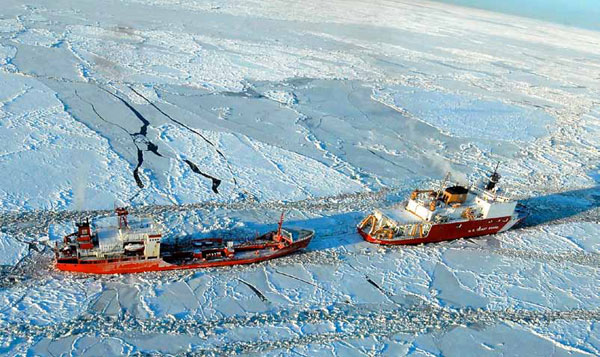Putting a Freeze on Arctic Ocean Drilling: America's Inability to Respond to an Oil Spill in the Arctic

When the Deepwater Horizon oil rig exploded in the Gulf of Mexico in the early morning hours of April 20, 2010 it spawned one of the worst environmental disasters in U.S. history. BP Plc’s Macondo well blowout lasted 89 days, spewing nearly 5 million barrels of oil into the Gulf of Mexico, and taking the lives of 11 men. The catastrophe showed the clear need for a massive, well-coordinated response when disaster strikes.
Though the refrain “never again” was echoed time and again in the wake of the BP oil catastrophe, we are now facing a new oil spill threat. After spending over five years and $4 billion on the process, the Royal Dutch Shell Group is on the cusp of receiving the green light to begin exploratory drilling in Alaska’s Beaufort and Chukchi Seas next summer. Though Shell emphasizes it would drill exploratory wells in shallow water rather than establishing deep-water production wells like Macondo, the fundamental characteristics of the vastly unexplored and uninhabited Arctic coastline may increase the likelihood of a spill and will certainly hamper emergency response capability.
The decision to move forward with drilling in some of the most extreme conditions on Earth has deeply divided Alaska Native communities, drawn stark criticism from environmental groups, and caused other federal agencies such as the U.S. Coast Guard and the National Oceanic and Atmospheric Administration, or NOAA, to raise concerns about the glaring absence of sound science in the region. This is highlighted in a recent letter to the Obama administration, signed by nearly 600 scientists from around the world, calling on the president and Secretary of the Interior Ken Salazar to follow through on their commitment to science and enact recommendations made by the U.S. Geological Survey before approving any drilling activity in the Arctic. In addition to the lack of a scientific foundation, the Arctic has inadequate infrastructure to deal with an oil spill, and response technologies in such extreme environmental conditions remain untested.
As we detail in this report, the resources and existing infrastructure that facilitated a grand-scale response to the BP disaster differ immensely from what could be brought to bear in a similar situation off Alaska’s North Slope. Even the well-developed infrastructure and abundance of trained personnel in the Gulf of Mexico didn’t prevent the Deepwater Horizon tragedy. Our Arctic response capabilities pale by comparison.
There are no U.S. Coast Guard stations north of the Arctic Circle, and we currently operate just one functional icebreaking vessel. Alaska’s tiny ports and airports are incapable of supporting an extensive and sustained airlift effort. The region even lacks such basics as paved roads and railroads. This dearth of infrastructure would severely hamper the ability to transport the supplies and personnel required for any large-scale emergency response effort. Furthermore, the extreme and unpredictable weather conditions complicate transportation, preparedness, and cleanup of spilled oil to an even greater degree.
Much of the Arctic region quite simply remains a mystery, largely untouched by human activity. Yet other Arctic countries are moving forward with oil and gas exploration—Russia signed a $7.9 billion exploration deal with BP last year and Exxon Mobil Corp. and Chevron Corp. are both expected to drill off Greenland over the next few years. Last year Norway rejected plans to drill in some areas north of the Arctic Circle, but has indicated it intends to ramp up production in the Barents Sea, a region it shares with neighboring Russia.
Due to the need for specially designed equipment, long supply lines, and limited transportation, a recent analysis from the nonpartisan U.S. Energy Information Administration found that “studies on the economics of onshore oil and natural gas projects in Arctic Alaska estimate costs to develop reserves in the region can be 50 to 100 percent more than similar projects undertaken in Texas.” Despite these hurdles, some in the United States are eager to keep pace with other Arctic nations by tapping into the “great opportunity” for economic gain they believe lies beneath the pristine Arctic waters. Drilling for oil in this fragile region, however, should not be pursued without adequate safeguards in place. If we’ve learned anything from the Deepwater Horizon tragedy, it’s that the importance of preparedness cannot be overstated.
You can return to the main Market News page, or press the Back button on your browser.

